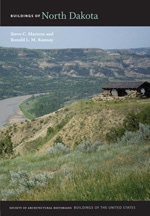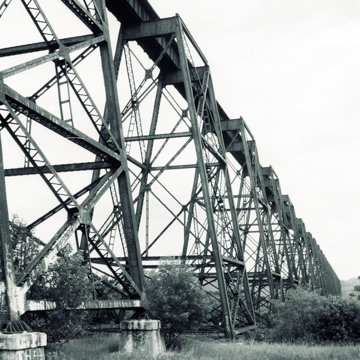The high-line trestle bridge was erected during the Second Great Dakota Boom by the Northern Pacific Railway (now BNSF). A substantial engineering feat was necessary to level the grade and supplant the low-line tracks that tortuously descended to the Sheyenne Valley floor and then climbed back out of the valley. The bridge is a riveted-steel structure that, when built, was the largest of its kind in the United States. Using 14 million pounds of steel, it is 3,838 feet long and 154 feet above low water in the Sheyenne River. This bridge was used mostly for transcontinental traffic and remains in use today. It is certainly not a stretch to refer to this engineering structure as iconic, since it is the iconic logo and mascot for Valley City athletic teams, the “Hi-Liners.”
You are here
Northern Pacific Railway Hi-Line Bridge
1908, Franklin Brothers, engineers; Morris Company, builders. Railroad track across 5th Ave. NE
If SAH Archipedia has been useful to you, please consider supporting it.
SAH Archipedia tells the story of the United States through its buildings, landscapes, and cities. This freely available resource empowers the public with authoritative knowledge that deepens their understanding and appreciation of the built environment. But the Society of Architectural Historians, which created SAH Archipedia with University of Virginia Press, needs your support to maintain the high-caliber research, writing, photography, cartography, editing, design, and programming that make SAH Archipedia a trusted online resource available to all who value the history of place, heritage tourism, and learning.









